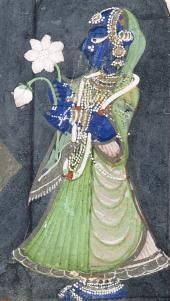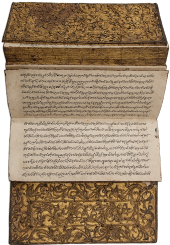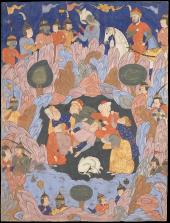Oral Tradition
महाभारतम्
- first compilation attributed to Vyasa
- (traditional Sanskrit epic, circa 800 BC to AD 400)
Part of the Hindi epic of the Mahabharata tells of King Kakudmi and his daughter Revati who travel to see the Creator Brahma for advice on which suitor Revati should marry. Although there is no time travel, the king and his daughter do experience a slowed passage of time so that during a short time for them, 27 chatur-yugas, each of which consists of four eras, have passed on Earth. —based on Wikipedia

 ‘‘किञ्चापि भवं कस्सपो एवमाह, अथ खो एवं मे एत्थ होति – ‘इतिपि नत्थि परो लोको, नत्थि सत्ता ओपपातिका, नत्थि सुकतदुक्कटानं कम्मानं फलं विपाको’’’ति। ‘‘अत्थि पन, राजञ्ञ, परियायो …पे॰… ‘‘अत्थि, भो कस्सप, परियायो…पे॰… ``यथा कथं विय, राजञ्ञाति? ‘‘इध मे, भो कस्सप, मित्तामच्चा ञातिसालोहिता पाणातिपाता पटिविरता अदिन्नादाना पटिविरता कामेसुमिच्छाचारा पटिविरता मुसावादा पटिविरता सुरामेरयमज्जपमादट्ठाना पटिविरता, ते अपरेन समयेन आबाधिका होन्ति दुक्खिता बाळ्हगिलाना। यदाहं जानामि – ‘न दानिमे इमम्हा आबाधा वुट्ठहिस्सन्ती’ति त्याहं उपसङ्कमित्वा एवं वदामि – ‘सन्ति खो, भो, एके समणब्राह्मणा एवंवादिनो एवंदिट्ठिनो – ये ते पाणातिपाता पटिविरता अदिन्नादाना पटिविरता कामेसुमिच्छाचारा पटिविरता मुसावादा पटिविरता सुरामेरयमज्जपमादट्ठाना पटिविरता, ते कायस्स भेदा परं मरणा सुगतिं सग्गं लोकं उपपज्जन्ति देवानं तावतिंसानं सहब्यतन्ति। भवन्तो खो पाणातिपाता पटिविरता अदिन्नादाना पटिविरता कामेसुमिच्छाचारा पटिविरता मुसावादा पटिविरता सुरामेरयमज्जपमादट्ठाना पटिविरता। सचे तेसं भवतं समणब्राह्मणानं सच्चं वचनं, भवन्तो कायस्स भेदा परं मरणा सुगतिं सग्गं लोकं उपपज्जिस्सन्ति, देवानं तावतिंसानं सहब्यतं। सचे, भो, कायस्स भेदा परं मरणा सुगतिं सग्गं लोकं उपपज्जेय्याथ देवानं तावतिंसानं सहब्यतं, येन मे आगन्त्वा आरोचेय्याथ – `इतिपि अत्थि परो लोको, अत्थि सत्ता ओपपातिका, अत्थि सुकतदुक्कटानं कम्मानं फलं विपाकोति।
‘‘किञ्चापि भवं कस्सपो एवमाह, अथ खो एवं मे एत्थ होति – ‘इतिपि नत्थि परो लोको, नत्थि सत्ता ओपपातिका, नत्थि सुकतदुक्कटानं कम्मानं फलं विपाको’’’ति। ‘‘अत्थि पन, राजञ्ञ, परियायो …पे॰… ‘‘अत्थि, भो कस्सप, परियायो…पे॰… ``यथा कथं विय, राजञ्ञाति? ‘‘इध मे, भो कस्सप, मित्तामच्चा ञातिसालोहिता पाणातिपाता पटिविरता अदिन्नादाना पटिविरता कामेसुमिच्छाचारा पटिविरता मुसावादा पटिविरता सुरामेरयमज्जपमादट्ठाना पटिविरता, ते अपरेन समयेन आबाधिका होन्ति दुक्खिता बाळ्हगिलाना। यदाहं जानामि – ‘न दानिमे इमम्हा आबाधा वुट्ठहिस्सन्ती’ति त्याहं उपसङ्कमित्वा एवं वदामि – ‘सन्ति खो, भो, एके समणब्राह्मणा एवंवादिनो एवंदिट्ठिनो – ये ते पाणातिपाता पटिविरता अदिन्नादाना पटिविरता कामेसुमिच्छाचारा पटिविरता मुसावादा पटिविरता सुरामेरयमज्जपमादट्ठाना पटिविरता, ते कायस्स भेदा परं मरणा सुगतिं सग्गं लोकं उपपज्जन्ति देवानं तावतिंसानं सहब्यतन्ति। भवन्तो खो पाणातिपाता पटिविरता अदिन्नादाना पटिविरता कामेसुमिच्छाचारा पटिविरता मुसावादा पटिविरता सुरामेरयमज्जपमादट्ठाना पटिविरता। सचे तेसं भवतं समणब्राह्मणानं सच्चं वचनं, भवन्तो कायस्स भेदा परं मरणा सुगतिं सग्गं लोकं उपपज्जिस्सन्ति, देवानं तावतिंसानं सहब्यतं। सचे, भो, कायस्स भेदा परं मरणा सुगतिं सग्गं लोकं उपपज्जेय्याथ देवानं तावतिंसानं सहब्यतं, येन मे आगन्त्वा आरोचेय्याथ – `इतिपि अत्थि परो लोको, अत्थि सत्ता ओपपातिका, अत्थि सुकतदुक्कटानं कम्मानं फलं विपाकोति। 


